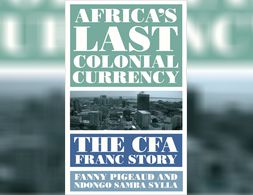✕
1062 results
An introductory course on Game Theory
In this course you'll learn about the tools used by scientists to understand complex systems. The topics you'll learn about include dynamics, chaos, fractals, information theory, self-organization, agent-based modeling, and networks.
Economics is extremely sick. It is so locked in its past that nearly all of its introductory textbooks are modelled on one that appeared in 1948. The discipline cannot continue in its autistic state much longer.
Game theory is the standard quantitative tool for analyzing the interactions of multiple decision makers. Its applications extend to economics, biology, engineering and even cyber security.
Imperialism is not only about military force and political pressure applied by developed capitalist countries on less developed ones for economic gain It also has an everyday dimension Countless acts of production and consumption the current SUV boom being a prominent example draw on exploitation of resources and labour from …
The world's leading economist of inequality presents a short but sweeping and surprisingly optimistic history of human progress toward equality despite crises, disasters, and backsliding.
Three dominant forces worldwide are driving change today in our financial markets: competition, technology and regulation. But their collective impact in reshaping the markets, though they may be viewed individually as desirable or well-intentioned, is producing challenging results that are difficult to predict, hard to control and not easy to understand.
Money is the fantasy that makes the world go round. Where did it come from and what is its future? From the Bank of England to Bitcoin and the Bristol Pound, LSE sociologist Nigel Dodd explores.
This course covers recent advances in behavioral economics by reviewing some of the assumptions made in mainstream economic models, and by discussing how human behavior systematically departs from these assumptions.
This course teaches basic concepts relevant in political economy. Topics include the contractual nature of the state, public versus private goods, property rights and economic externalities, the logic of collective action and social choice theory. It also refers to the fundamentals of political philosophy, bringing two ideas of liberty into the picture. The relevance and limitations of the economic approach to the study of law and politics are then discussed.
Rethinking Regulation of International Finance encapsulates the most important aspects of the development and operation of the international financial system. This book questions the fundamental basis of the existing international financial architecture (soft law) and explores the need for a compliance-based model based on legitimacy of regulations and accountability of the regulatory bodies in international financial stability.
What is economics? What can - and can't - it explain about the world? Why does it matter?
The world is still feeling reverberations from the financial crisis of 2008 foreseen by neither politicians nor economists The history of capitalism has been punctuated by major crises exposing the fragility of our entire economic system How has capitalism despite these ruptures managed to each time resurface more resilient and …
A comprehensive account of how government deficits and debt drive inflation
Financial Evolution at the Speed of Thought A new evolutionary explanation of markets and investor behaviorHalf of all Americans have money in the stock market yet economists can t agree on whether investors and markets are rational and efficient as modern financial theory assumes or irrational and inefficient as behavioral …
A previously unpublished collection of Rodney's essays on Marxism, spanning his engagement with of Black Power, Ujamaa Villages, and the everyday people who put an end to a colonial era
The course approaches migration as a constant phenomenon in human history and examines its main supporting theories It illustrates theories about people s individual decisions to migrate and also the factors of migration as a structural feature of our societies It explains the role social networks and institutions play in …
This book discusses the relationship between pluralist economics and the case study method of teaching, advocating the complimentary use of both to advance economics education. Using a multi-paradigmatic philosophical frame of analysis, the book discusses the philosophical, methodological, and practical aspects of the case study method while drawing comparisons with those of the more commonly used lecture method.
Colonialism persists in many African countries due to the continuation of imperial monetary policy. This is the little-known account of the CFA Franc and economic imperialism.
This brilliantly concise book is a classic introduction to Marx’s key work, Capital. In print now for over a quarter of a century, and previously translated into many languages, the new edition has been fully revised and updated, making it an ideal modern introduction to one of the most important texts in political economy.
Potts (economics, University of Queensland) proposes evolutionary microeconomics as a synthesis of the collective schools of heterodox economic thought with complex systems theory and graph theory.
This unique up-to-date volume not only provides state-of-the-art discussions of the most recent developments in modern macroeconomics but also includes a series of interviews with leading economists that shed new light on the major intellectual and policy issues of the 1990s. The book is at once an invaluable text and a superb overview that will be welcomed by teachers and students alike.
Financialization is one of the most innovative concepts to emerge in the field of political economy during the last three decades, although there is no agreement on what exactly it is. Profiting Without Producing by Costas Lapavitsas puts forth a distinctive view defining financialization in terms of the fundamental conduct of non-financial enterprises, banks and households.
Since the Middle Ages, literature has portrayed the economic world in poetry, drama, stories and novels. The complexity of human realities highlights crucial aspects of the economy. The nexus linking characters to their economic environment is central in a new genre, the "economic novel", that puts forth economic choices and events to narrate social behavior, individual desires, and even non-economic decisions.
This blog post reviews "Democratizing Finance", an edited volume that analyses and provides policy proposals to ensure that the financial system serves the public good. Mquzama undertakes the task of summarising the main takeaways from each essay in the book as well as an exposition of its shortfalls. While he acknowledges the necessity of the book's reimaging capitalism and the financial system in a way that is practical within the current economic and political structures, he also highlights its failure to look beyond the United States of America.
Is inflation just a number game or does it hold deeper societal implications? Join Isabella Weber (@UMass.Amherst) as she challenges traditional economic stances on inflation and delves into the social dimensions of pricing. Discover how context shapes our reactions to price hikes and why understanding this can be a game-changer.
Economics should schematically explain the key elements and main strands of this core part of social life: the actual workings of our economies. This book argues that orthodox, modern neoclassical economics does not fulfil this core task. Standard economics models do not address the real functioning of our market economies, but rather an imagined economy.
So, what does racism have to do with our 21st century economic system? How can we understand institutions who uphold racism while claiming to value diversity and inclusion? And what does it mean to truly be anti-racist?
This lecture offers a general and introductory overview of the theory of racial capitalism, focusing on the origins of racial capitalism and some of the debates it has generated.
This guide contains a collection of recommended YouTube channels and YouTube videos in the fields of economics, business and economic policy.
This is an introductory course into economics that navigates the intellectual history of political economy in a self-contained and non-technical manner. The course centres on the classical concept of political economy by emphasizing the moral and ethical problems that markets solve or may not solve.
In Colonial Debts Rocío Zambrana develops the concept of neoliberal coloniality in light of Puerto Rico's debt crisis. Drawing on decolonial thought and praxis, Zambrana shows how debt functions as an apparatus of predation that transforms how neoliberalism operates.
We use cookies on our website. Click on Accept to help us to make Exploring Economics constantly better!




























